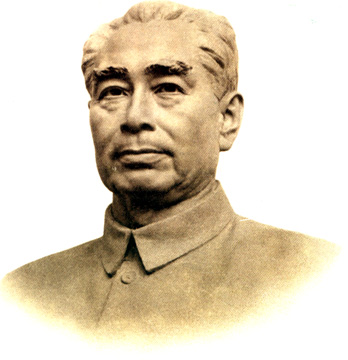
Zhou Enlai bust
by Li Shouren and Liu Lin

Zhou Enlai bust
by Li Shouren and Liu Lin
Written: August 16, 1945
First Published: 1981 (English translation)
Source: Selected Works of Zhou Enlai, Volume 1
Online Version: Zhou Enlai Internet Archive, December 2002
Transcribed/HTML Markup: Roland Ferguson
1. For several days now, Chiang Kai-shek has been intensifying his propaganda for civil war, and he has mobilized Chinese and foreign newsmen close to him to spread the propaganda abroad. He is trying to shift the blame onto us and to frighten the people so that he may have a free hand in unleashing civil war and continuing his dictatorship.
2. In order to expose Chiang Kai-shek's scheme, we should concentrate on propagating the four slogans against civil war, against dictatorship, for peace and for democracy. On specific issues, we: should emphasize our right to disarm the Japanese and puppet troops whom we have already encircled. We should point out that for the last five or six years Chiang Kai-shek has refused to recognize the armed forces of the Liberated Areas or to send them supplies and that he has not been in command of them. Now he suddenly instructs them to stay where they are, pending further orders. 2) He hopes that this will enable him to accept the Japanese surrender himself and to incorporate the puppet troops into his own armies. We are opposed to taking irrational orders; that is, we are opposed to civil war. In fact, Chiang Kai-shek long ago forfeited his right to issue orders to the anti-Japanese armed forces in the Liberated Areas. Should the Supreme Commander of the Allied Forces 3) arbitrarily order the Japanese troops to surrender only to Chiang's army and not to ours, it would be tantamount to aiding Chiang to unleash a civil war, and we would firmly oppose it. Chiang first rejected negotiations between the Kuomintang and the Communist Party in his speech of March 1 and then rejected the plans brought back by the six councillors. 4) Furthermore, he vilified us as enemies of the people. His invitation to Mao Zedong to go to Chongqing is therefore sheer deception. All Chiang's present propaganda is a preparation for civil war, but it is often confused and full of loopholes. In the newspapers and among influential Chinese and foreigners you should firmly denounce Chiang's intrigues, co-ordinating your statements with the broadcasts from Yan'an so as to discredit his reactionary propaganda and arouse all sections of the people. The current international and domestic situation is most favourable to our struggle against Chiang's intended civil war. We hope that you will continue to pursue this policy so as to mobilize the masses and consolidate and extend the victory we have already won.
[A] In the original transcription of this work, the Editorial Committee on Party Literature (Central Committee of the Communist Party of China) opted to separate editorial and explanatory notes into two separate categories, independently numbered relative to (1) the type of note and (2) chronological appearance in the text.
1. Directive drafted on behalf of the Central Committee of the Communist Party of China and addressed to its Chongqing Bureau.
2. Chiang Kai-shek's order issued on August 11, 1941 to Zhu De, commander-in-chief of the Eighteenth Group Army, reads in part: “All units of the Eighteenth Group Army should stay where they are, pending further orders. ...No unauthorized action is to be taken”against Japanese and puppet forces.
3. 0n August 10, 1945, the Japanese Government issued notes to the Allied Powers — China, the Soviet Union, the United States and Britain — which had been fighting against Japan, to arrange for its surrender. On August 12, the Governments of China, the Soviet Union and Britain agreed to the U.S.-proposed appointment of MacArthur, commander of the American ground troops stationed in the Pacific region, as the Supreme Commander of the Allied Powers occupying Japan. China, the Soviet Union and Britain all sent senior generals to participate in the Supreme Command of the Allied Forces and to accept the surrender of Japan.
4. In January 1945, on behalf of the Central Committee of the Communist Party of China, Zhou Enlai proposed to the Kuomintang government that a preparatory conference of the various political patties and groups be convened prior to holding a conference on state affairs. The preparatory conference would formally discuss the question of the conference on state affairs and procedures for the organization and institution of a coalition government. Chiang Kai-shek rejected this CPC proposal in a speech on March 1. On July 4 of the same year, the Communist representatives reached agreement with the six councillors who had come to Yan'an — Chu Fucheng, Huang Yanpei, Leng Yu, Fu Sinian, Zuo Shunsheng and Zhang Bojun — on a proposal to the Kuomintang government to“suspend the National Assembly and convene a political conference as soon as possible.” In his opening speech to thc People's Political Council on July 7, Chiang Kai-shek went so far as to slander as a“wanton attack”the rational criticism by the Communist Party and the democratic parties of the Kuomintang's insistence on convening the National Assembly under its autocratic control. A resolution passed on July 19 by the Kuomintang-controlled Political Council once again rejected the demand for a conference of political parties and groups, the abolition of the one-party dictatorship and the establishment of a coalition government.